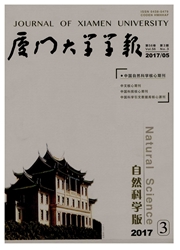

 中文摘要:
中文摘要:
酪氨酸酶(EC1.14.18.1)是生物黑色素形成的关键酶,该酶抑制剂在果蔬防褐变保鲜中具有重要的应用前景.在筛选酪氨酸酶活力抑制剂过程中,发现苯丙酸对蘑菇酪氨酸酶活力有明显的抑制作用,对蘑菇防止褐变具有较好的保鲜效果.报道了苯丙酸对蘑菇酪氨酸酶单酚酶活力和二酚酶活力的影响和抑制作用.结果表明,苯丙酸对蘑菇酪氨酸酶的单酚酶的效应不仅降低了酶促反应的稳定态活性,也延长了酶促反应的迟滞时间,并具有浓度依赖关系.当苯丙酸浓度达10.0mmol/L时,稳定态活力下降2/3,迟滞时间从100S延长到140s;苯丙酸对二酚酶活力的抑制也显示浓度效应,抑制效果更为显著,引起酶活力下降50%的抑制剂浓度(IC50)为2.05mmol/L,苯丙酸对二酚酶活力的抑制显示可逆的效应,抑制类型为混合型,抑制常数(KI和KIS)分别为1.570和3.070mmol/L.
 英文摘要:
英文摘要:
Tyrosinase (EC 1.14.18.1) is a key enzyme.of melanin synthesis. Its inhibitors hold great promise for anti browning of fruit and vegetable. During screening the inhibitors, benzenepropanoie acid was discovered as mushroom tyrosinase inhibitor. It had obvious inhibition ability and could prevent mushroom browning and retain freshness. In the present paper,the effects of benzenepro panoic acid on the monophenolase and diphenolase activity of mushroom tyrosinase, and inhibition kinetics were studied. The results showed that benzenepropanoic acid not only depressed the activity of the steady state activity but also prolonged the lag time for the monophenolase with dose-dependence. When the concentration of benzenepropanoic acid reached 10.0 mmol/L, the enzyme activity decreased two-thirds,and the lag time prolonged from 100 s to 140 s. Benzenepropanoie acid also could inhibited the diphenolase activity of mushroom tyrosinase with dose-dependence,and the inhibitory effect was more notable, the inhibitor concentration leading to 50% activity lost (IC50) was determined to be 2.05 mmol/L. The inhibition of benzenepropanoic acid on the diphenolase activity was reversible.The inhibition type belonged mixed, and the inhibition constants (KI and KIS) were determined to be 1. 570 mmol/L and 3. 070 mmol/L,respectively.
 同期刊论文项目
同期刊论文项目
 同项目期刊论文
同项目期刊论文
 期刊信息
期刊信息
